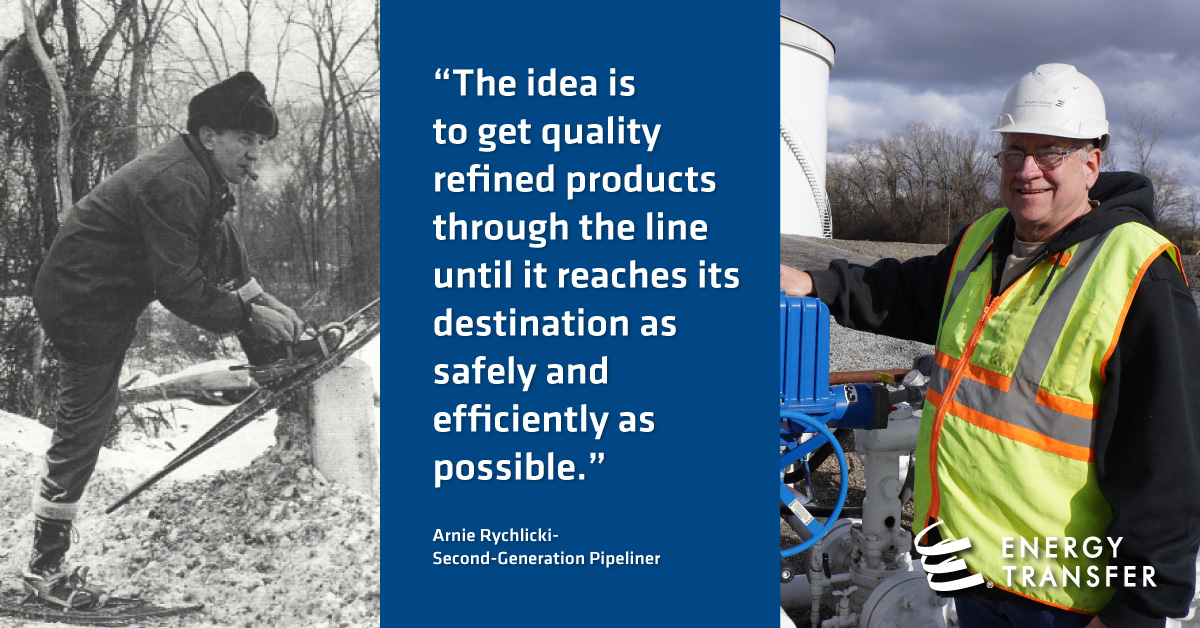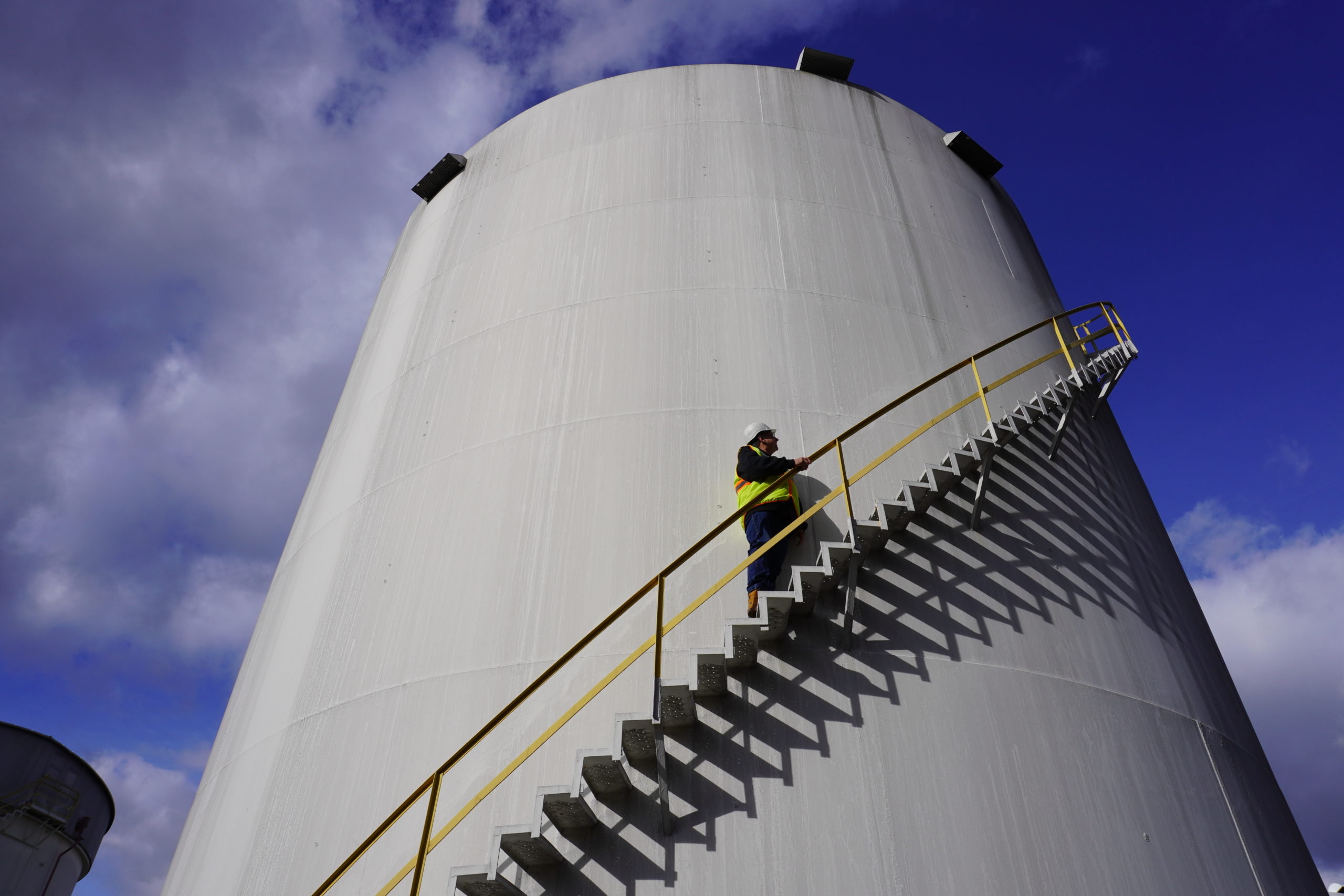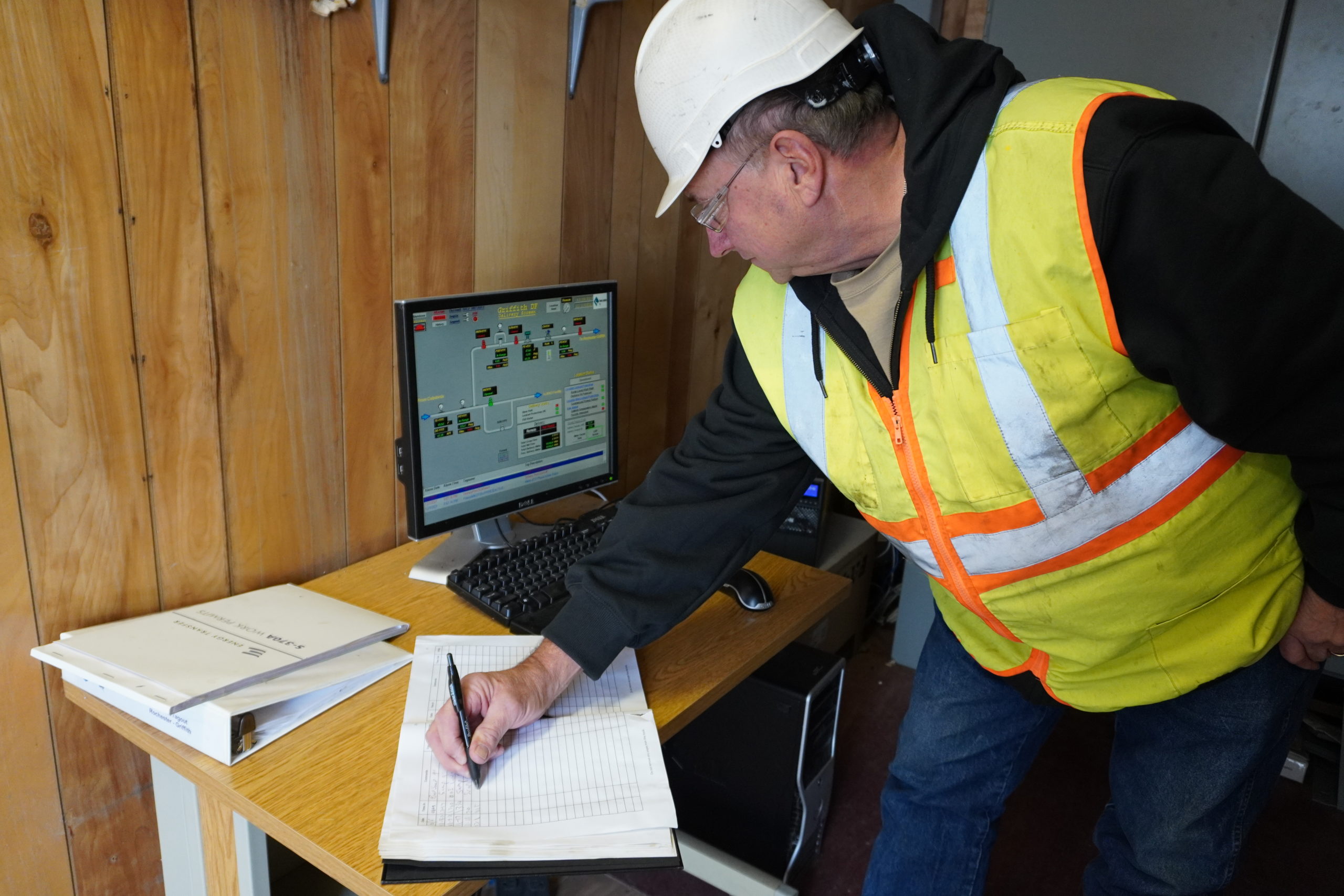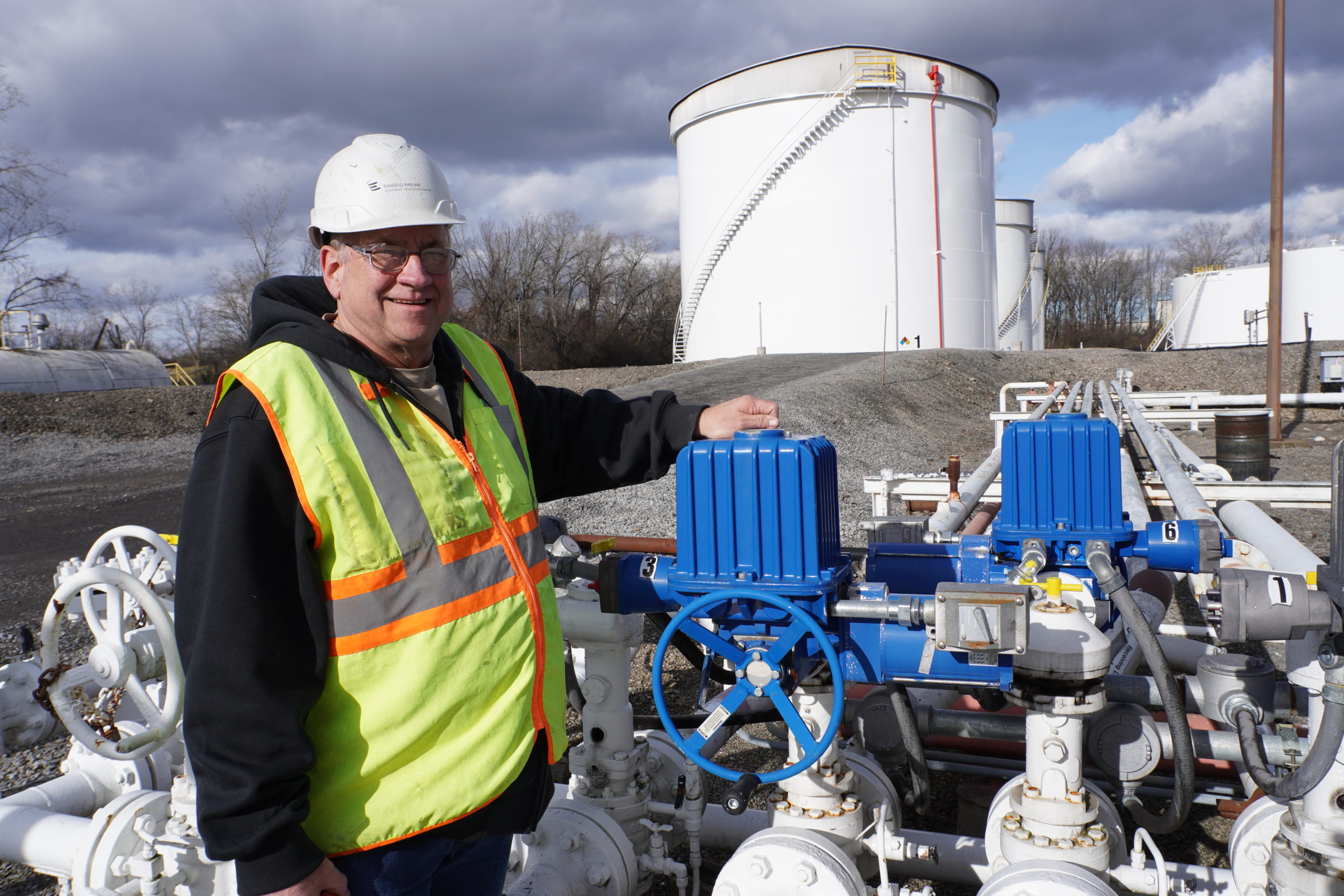‘Pipelines Are In Our Blood’
Arnie has worked as a pipeliner for Energy Transfer subsidiary Sunoco Pipeline for 36 years after learning everything he could from his father, Stanley.
Stanley Rychlicki began walking pipelines in 1950 for Atlantic Pipeline Corp., which was later acquired by Sunoco, in Berks County, PA.
“It was tough, but he said it was a lot better than working in the coal mines,” Arnie said of his late father. “He saw depression, he was in World War II – and he felt working for the pipeline was a gift to him.”
Stanley transferred with his family from their hometown in Nanticoke, PA, to Caledonia, NY, in 1960, becoming a line walker in the Rochester area. He spent every day “walking the pipeline” to monitor any signs of product release or third-party damage.
“Down in Pennsylvania, in the mountains, he’d have to put up with the snakes, the bugs and of course the mountains – but then up here, when he transferred, he had to put up with the snow,” Arnie said. After walking an astonishing 15 to 20 miles per day, sometimes requiring wearing snowshoes, Stanley would have walked so far that Arnie would drive with his mother to pick him up at the end of the line and bring him home. If she was too busy taking care of the kids, Arnie said, Stanley would have to “thumb it” home, or hitchhike.
But, as with most things, the job has changed over time, thanks in large part to technology. Today, Arnie spends most of his travel time in his vehicle. On slow days with no digs or meetings, he still “drags the line,” driving slowly alongside the right-of-way, but most line patrol is now done from the air by aerial patrol crews. Rather than miles on foot, Arnie puts about 35,000 miles per year on his truck, in all weather conditions.
The pipelines in Arnie’s territory carry refined products, including gasoline and diesel fuel, from Pennsylvania to Rochester. The products flowing through the line are not entirely relevant to his duties as a pipeliner, however – be it natural gas, natural gas liquids, oil or refined products.
A Day in the Life
If you’d ask Arnie what he does each day, he would tell you it varies, and that’s what he likes about it, along with abundant fresh air. His home base is the Caledonia Pump Station, but he spends much of his time in the field.
The bulk of his work centers around “One Call” tickets through the Dig Safely New York Program, similar to the Pennsylvania One Call System. Every time someone plans to dig – from a homeowner installing a mailbox or planting a tree, to another utility digging to repair an underground line – they are required to call a number three days prior. When this happens in the vicinity of the Sunoco pipeline right-of-way, Arnie receives an alert and is responsible for going to the site and marking the Sunoco pipeline with flags and/or spray paint to ensure the excavation doesn’t impact the pipeline. If he determines there is a safe distance from the dig site to the pipeline, Arnie can instead respond with a “clear, no contact” signal. Arnie and his partner cover five counties in New York and average 750 One Calls per month.
Scroll to the end for a photo slideshow.
When he’s not responding to One Calls, Arnie spends his time doing any number of things:
- Patrolling road crossings
- Maintaining or replacing pipeline markers
- Performing facility walk-throughs at pump stations, takeoff points and tanks at the Rochester Terminal
- Operating valves for pig runs, which are routinely done to inspect pipelines for corrosion or anomalies
- Assisting with aerial patrols along the pipeline route
- Monitoring other construction activity in the right-of-way
- Attending meetings and safety trainings
- Communicating with landowners
As a “satellite” pipeliner, he is also on call 24/7, standing ready to respond to concerns including pressure drops, reports of odors, noise or security breaches at pump stations, power outages, water or gas line or pole breaks near the pipeline, and more. It helps that he lives right down the road from the pump station.
He wears a lot of hats, he says, because of his distance from other employees. Arnie has even been involved with a few horse burials, as well as underwater inspection in a canal where the pipeline crosses underneath. All of this is to ensure safe excavation and to prevent damage to the pipelines in his territory.
The primary role of a pipeliner is to properly maintain the pipelines, pump stations and takeoff points, and to ensure they are as protected as possible. However, in the rare event of an incident along the pipeline or at a facility, pipeliners like Arnie are often the first line of defense.
“This job is critical, as you are most likely going to be the first one on scene for an emergency before the ‘cavalry’ shows up,” Rychlicki said.
Arnie also works closely with the Energy Transfer control center if an issue arises. The control center is typically able to shut off valves remotely, as necessary, to stop product flow while repairs are made. But sometimes, especially in the event of a power outage, Arnie has to shut them off manually.
“In 1991 we had a large ice storm, and most of the power went out for two to three counties for at least two weeks. The city of Rochester was running out of gasoline and diesel, and so at least one of our pumps from way down south in Pennsylvania was pushing it up to Rochester,” Arnie explained.
“Needless to say, they needed manpower to open and close the particular valves for particular products, and at the pump stations we had to keep everything open. When the power goes out, you still need human beings to go out there and turn things manually and do things by hand.”
In addition to the control center, there are many people Arnie coordinates closely with on a daily basis. They include his co-workers, crew and supervisors; the One Call center; right-of-way agents; engineers; landowners; and more.
“The idea is to get quality refined products through the line until it reaches its destination as safely and efficiently as possible,” Arnie described. “The pipeline’s integrity is paramount to that, and to the safety of the public and the environment.”
Relationships Are Key
Arnie takes a lot of pride in his work and in the close relationships he has maintained over the years. Those relationships have allowed him to do his job safely and effectively and to maintain the trust of landowners and other key stakeholders.
One landowner is Brett Kreher of Kreher Family Farms, a chicken farm in Clarence, NY, that supplies eggs to major U.S. companies. The pipeline crosses below the farm, requiring ongoing communication when the Krehers have plans for their property such as parking lot expansions, putting in new signs and more – making sure the depths are appropriate and meet Sunoco’s standards.
“It’s so important for us to stay safe in this complex, because you guys run the world – everybody depends on you,” Kreher said to Arnie, referring to the energy and pipeline industry.
Meanwhile, Arnie works with his aerial patrol crew to make sure they keep the helicopter high when passing over the farm to avoid scaring or disturbing the chickens.
“We appreciate working with Arnie, because he understands our farm and what we’re trying to do here,” Kreher said. “Arnie has been with the company for so many years that he understands our moves before we even make them.”
The long-standing history between the Krehers and the Rychlickis has been not only cordial but productive and mutually beneficial.
“With a lot of companies, you’re meeting a new face every time you meet with a representative. … With Arnie, more than 30 years ago, it went from his father to our current representative, and that’s been very helpful to us,” Kreher said. “There’s maybe more trust there than there is with a lot of relationships, because we’ve known each other for generations.”
Trainings and Meetings are Paramount
Believe it or not, even after shadowing his father on the pipeline route, Arnie earned biology and chemistry degrees and was originally certified as a medical technician. He was working in hospitals and labs when he ultimately realized that pipeline work was his passion and would require 24/7 commitment, leading him to change course.
When he began working as a pipeliner, Arnie said, most of his training was done on the job, including riding with his dad for six months. Now, he says, Energy Transfer and the government require pipeliners to be “OQ,” or operator-qualified. This means, every couple of years, Arnie renews his qualifications by taking a test on operating a valve, checking a pipeline for corrosion, standard operating procedures and more. In addition, he regularly takes online safety courses.
He finds time to attend a variety of safety meetings, convening with Dig Safely New York, the Western New York Damage Prevention Council and the regional Utility Coordinating Committee, all of which promote safe digging and coordination.
He also speaks and exhibits at Paradigm Coordinated Response Exercise (CoRE) training sessions, sponsored by Energy Transfer and other pipeline operators to educate first responders and other stakeholders about natural gas and petroleum pipeline safety and how to react in the event of an incident. Arnie knows all of the first responders in his area and invites them to Dig Safely New York meetings and CoRE sessions. In addition, he speaks at the Local 17 Operating Engineers apprentice school and educates first responders at area fire departments. He also hosted a tabletop drill at the Caledonia Pump Station.
Giving Back to the Community
Outside of work, Arnie exemplifies civic responsibility and ingraining himself in the community where he lives and works. From serving for 15 years on the local board of education, to planning fundraisers and parades, to volunteering as an usher in his church and playing the trumpet in community bands for 50 years, Arnie says communities depend on people volunteering and giving back in order to thrive and survive.
“My wife and kids have followed suit and also understand the importance and value of volunteerism and giving back,” Arnie said.
Full Circle
Arnie was hired two days after his father retired from a 35-year pipelining career.
Now 36 years in – plus the 25 years he followed his dad, which he counts – Arnie isn’t quite ready to hang up the proverbial boots. He still takes pride in what he does every day, and he’s working on passing on that knowledge and skill to the next generation.
Arnie has three children, including a son who is similarly following in his footsteps, just as Arnie did with his father. “Pipelining is in his blood. He someday wants to work in this position,” Arnie said.
Regardless of what the future holds, the decades-long Rychlicki pipelining legacy remains strong and continues to serve the Energy Transfer family well.












